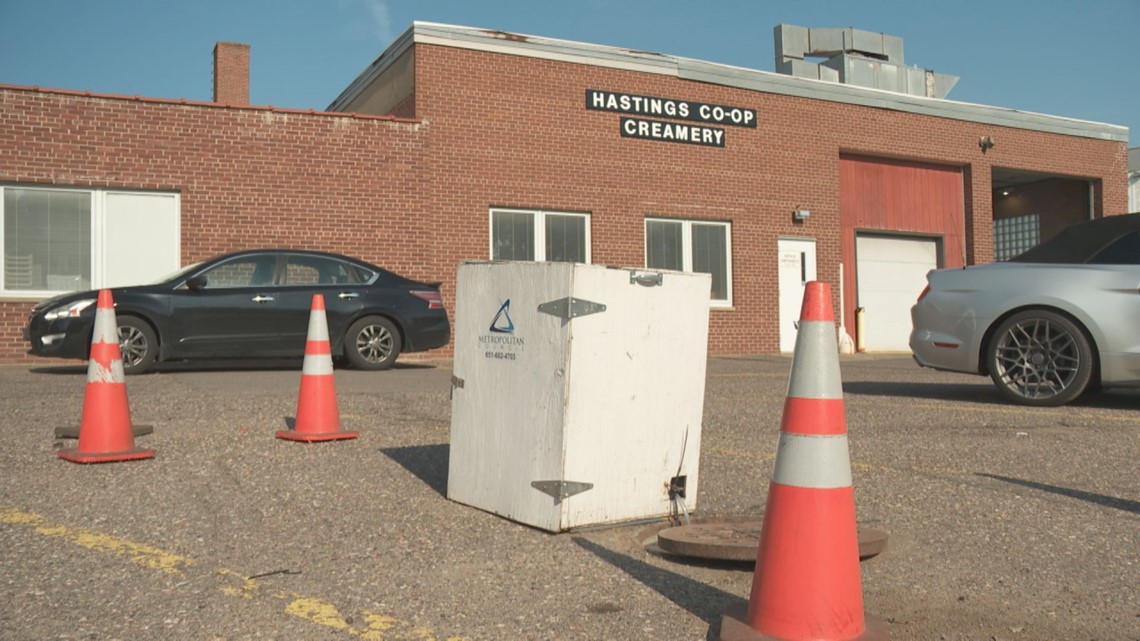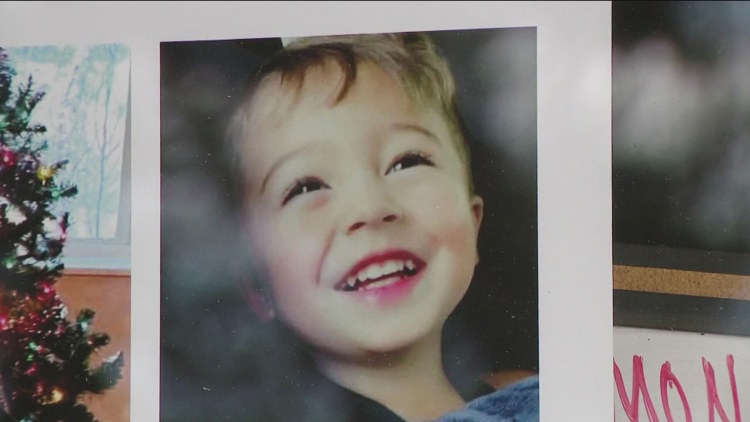Kare11
Hastings Creamery struggles with regulators


HASTINGS, Minn. — The Metropolitan Council will temporarily cut off sewer service for a dairy processing company that dates back more than a century, putting the plant’s owners in a tough spot with customers and milk suppliers.
The regional agency says the Hastings Creamery has been out of compliance with its industrial wastewater permit and a recent leak placed a strain on the city’s treatment plant.
“The ongoing release of prohibited materials is putting the wastewater treatment plant in imminent danger and could compromise the health and safety of the Hastings community,” read a statement from the Met Council Saturday evening.
“We have unfortunately recorded six notices of violations of industrial waste permits from the Hastings Creamery in the past seven months. As a result, we are suspending its ability to discharge industrial waste for treatment at the Hastings Wastewater Treatment Plant.”
The creamery processes 150,000 pounds of raw milk each day, purchased from dairy farmers in Minnesota and Wisconsin. It produces a variety of dairy products, some under the Hastings Creamery label and some for other companies and grocery store chains.
“When things are fully staffed, there’s 35 to 40 people that work here. On top of that there’s another 45 farm families that wouldn’t have anywhere to go with their milk,” Justin Malone, one of the creamery’s owners, told KARE.
Malone, a third-generation dairy farmer, bought the creamery with three other farmers two years ago. He pointed out it’s already a tough time in the dairy industry, as some farmers have had to dump milk because they can’t find any processing plants with the capacity to accept it.
That’s one of the reasons the Minnesota Dept. of Agriculture is monitoring the situation, out of concern for producers that would be affected if the creamery decides to stops buying their milk.
Malone said he and his partners were unaware at the time they bought the 1955 plant that the average wastewater discharge had been out of compliance with the Met Council’s standards since 2013.
“We weren’t aware that was in violation of the permit. We’re not blaming that on anyone. We’re just trying to partner with Met Council and get things where they can be okay.”
Once the plant loses its connection to the city sewer system, the only way to stay in operation will be to collect the wastewater on site and truck it to a different wastewater treatment plant that’s equipped to handle the water that comes from the creamery.
The Met Council will continue to monitor the outflow from the plant and may reconnect it to the sewer system after 30 days if enough conditions are met.
“We have a two-year plan to change how the wastewater leaves the creamery. We’re just wanting to try to get to that point without having to shut down, because it’s going to be rally hard on everybody,” Malone said.
The Met Council monitors the levels of FOG — fats, oils, and grease — coming from the creamery, and checks to see if the wastewater is PH-balanced. The long-term solution is to build a small treatment plant at the the creamery, which would cost more than $900,000.
Rep. Shane Hudella, a Republican who represents the Hastings area, said the creamery’s dairy store is part of the fabric of life in the Mississippi River town. Many families, including his own, buy their milk there.
“If it closes it would be pretty tragic news because the creamery’s been a staple in our community for decades and decades,” Rep. Hudella told KARE.
“I would really love to appeal to the chair of the Met Council and Governor Walz to step in and give us a week to figure out what the issues are, and how we can fix them. They want to be compliant.”
Malone said the discharge from the creamery is from milk and cream that is released when changing the machinery from one product to another. There’s also a certain amount lost when the sanitizer fluid moves through the equipment.
“That’s how a creamery operates. You’re flushing lines. You’re changing different kinds of milk, one percent, two percent. You have sanitizers that are flushed out, and you have milk that’s flushed through the lines when you start up again.”
The Met Council’s emergency order cited an incident over Mother’s Day weekend when the water at Hasting wastewater treatment plant turned white, and staff photographed a thick, creamy froth in the aerator section of the plant.
According to the agency’s document, the staff said one of the tanks leaked milk into the sewer system because of a faulty valve. The company was unaware of the leak until a couple of days later and couldn’t determine how much milk escaped the tank.
That led the Met Council staff to estimate the size of the leak by testing the concentrations of milk in samples collected at the wastewater plant and comparing it to how much water the plant used during that time period. The agency came up with an estimate of 169,000 gallons of milk leaked across a 16-hour period between May 12 and May 13.
The staff said the amount would be different if both cream and milk entered the system, guessing it would be 10,000 gallons of whole milk and 5,000 gallons of cream.
The company’s industrial wastewater permit is tied the Met Council Waste Discharge Rule 406.04, which bars the discharge of “any wastewater containing fat, wax, tallow, grease, or oil of animal or vegetable origin in excess of 100 milligrams per liter, that has a potential to solidify, become viscous, or become water insoluble, and is likely to cause obstruction to the flow in public sewers or cause interference or pass-through.”
Kare11
Minneapolis City Council overrides mayor’s veto on carbon fees


Minneapolis Mayor Jacob Frey questioned the legality of the new measure while issuing his veto on Wednesday.
MINNEAPOLIS — The City of Minneapolis will move ahead with new carbon fees after a contentious back and forth at City Hall concluded with the council overriding the mayor’s veto.
The new fees, which target carbon emissions from city businesses, will be implemented on July 1, 2025, according to the council.
Minneapolis already has a pollution fee system, known as the Pollution Control Annual Registration or PCAR. The fees go into the city’s Green Cost Share program, helping pay the costs companies incur bringing down their emissions.
The current PCAR system covers emissions of other air pollutants, including volatile organic compounds, heavy particulates, and sulfur oxides, nitrous oxides, lead, and carbon monoxide. Companies are required to report their emissions levels to the Minnesota Pollution Control Agency, which, in turn, charges fees of $100 per ton.
The City Council voted Oct. 2 to add carbon dioxide to the list. The resolution seeks to impose a $452 per ton fee for carbon dioxide.
Minneapolis Mayor Jacob Frey questioned the legality of the new measure while issuing his veto on Wednesday.
“I am all on board for PCAR fees—but it’s time the Council stops playing games and follows the processes in place to enact lasting change,” said Mayor Jacob Frey, in a statement to KARE.
Before his veto was overridden, Frey had told KARE that if the measure were to move forward, companies hit with the fees would likely sue the city and win.
Council Member Robin Wonsley, who co-authored the measure, took to X (formerly Twitter) to respond to Frey’s veto on Wednesday night.
Kare11
Charges filed in death of Elijah Vue


Wisconsin law enforcement said Katrina Baur, and her partner, Jesse Vang, are facing charges in connection with 3-year-old Elijah Vue’s death, including obstruction.
TWO RIVERS, Wis. — About a month after 3-year-old Elijah Vue’s remains were recovered from a private property in Wisconsin, state authorities announced Thursday that charges have been filed against the boy’s mother and her partner.
Wisconsin law enforcement said Katrina Baur, and her partner, Jesse Vang, are facing charges in connection with 3-year-old Elijah Vue’s death, including obstruction.
Vue went missing in February and it wasn’t until September that his body was recovered and identified.
Kare11
Wadena High School football coach cancels remainder of season


Wadena-Deer Creek head coach Kyle Petermeier told families in a letter that a rash of injuries has reduced the roster to the point that playing is a “safety issue.”
WADENA, Minn. — A central Minnesota high school is pulling the plug on the remainder of its varsity football season, saying continuing to play would not be “safe or realistic.”
Wadena-Deer Creek head coach Kyle Petermeier sent a letter home to families earlier in the week, explaining the decision to skip the Wolverines’ final game and subsequent district playoffs. Petermeier said injuries began piling up as the club reached midseason, and roster numbers hit a dangerous low following Wadena-Deer Creek’s game in week 7.
Heading into the final regular season game against Staples-Motley, Wadena-Deer Creek had just eight healthy players from 10th to 12th grade. At that point, the coach said, a difficult but necessary decision had to be made in the interest of safety.
“We are in a position now where we would have to trot out a majority of our team that is 14 and 15 years old, and that is not in the best interest of our kids,” coach Petermeier explained. “To us, safety is ahead of any individual game result. Football is a physical sport and putting out a team of mostly 14-15 year olds vs. 17-18 year olds is not safe or realistic for our team, and even the opposing team playing. “
Before the decision to end their season, the Wolverines were 1-6 on the year, losing games by up to 50 points.
Coach Petermeier credited this year’s varsity squad for their preparation, training and effort, and told parents he believes the future of the Wadena-Deer Creek football program is bright with big participation numbers with players at the fifth- to ninth-grade levels.
“Football is a game that requires strength in numbers, and we will do anything we can to keep these numbers high and keep kids out for football,” he promised.




GIPHY App Key not set. Please check settings